Academics Stand in Support of Palestine
• Defend the Right to Speak and Organize
• ASA Resolution on Boycott of Israeli Academic Institutions
• ASA Members Vote To Endorse Boycott of Israeli Academic Institutions • Action Needed to Stop Passage of Dangerous Bill in NY State Assembly Opposing Free Speech •
Professional Staff Congress-CUNY Opposes NY State Bills Punishing Those Advocating Boycott of Israel
Academics Stand in Support of Palestine
Defend the Right to Speak and Organize
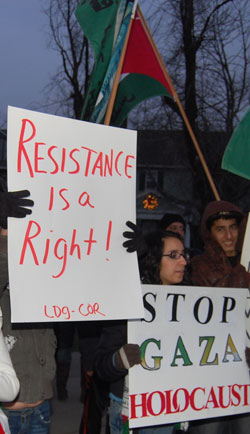 The American Studies Association (ASA) recently passed a resolution opposing U.S. support of the Israeli occupation of Palestine and joining the call for a boycott of Israeli academic institutions. Within a few weeks, the New York State Senate quickly passed a bill that would collectively punish any college supporting, or simply participating with an organization calling for a boycott of Israel. The bill would remove all state funding for a year for any college that did so. In introducing a similar bill in the New York State Assembly, Speaker Sheldon Silver specifically cited the resolution by the ASA as the reason the bill was needed.
The American Studies Association (ASA) recently passed a resolution opposing U.S. support of the Israeli occupation of Palestine and joining the call for a boycott of Israeli academic institutions. Within a few weeks, the New York State Senate quickly passed a bill that would collectively punish any college supporting, or simply participating with an organization calling for a boycott of Israel. The bill would remove all state funding for a year for any college that did so. In introducing a similar bill in the New York State Assembly, Speaker Sheldon Silver specifically cited the resolution by the ASA as the reason the bill was needed.
Voice of Revolution condemns these bills and all efforts to silence opposition to U.S.-Israeli crimes against the Palestinians. Holding debates, passing resolutions, organizing resistance are rights, in Palestine and on campuses across the country. They must be vigorously defended, especially now when the ruling circles have no alternatives to crises and must resort to more wars and repression. Passage of such bills in New York is an invitation to all states to impose more attacks on the right to speak and organize in general and specifically in support of Palestine. They are an effort to dictate what can and cannot be debated and the right of academic bodies, like the ASA, to take their stands. They are a form of collective punishment, itself a crime — something imposed daily on the Palestinian people by the U.S.-Israeli occupation. This is not acceptable.
As the ASA resolution states, “The United States plays a significant role in enabling the Israeli occupation of Palestine and the expansion of illegal settlements and the Wall in violation of international law, as well as in supporting the systematic discrimination against Palestinians.” Voice of Revolution joins the many organizations opposing these New York bills and demanding that the rights of Palestinians be respected and that the U.S. end its funding and political backing for all attacks against the Palestinians. The way forward is to end all U.S-Israeli aggression, end the occupation and free Palestine now!
End the Occupation Now!
Defend the Right to Speak and Organize!
[TOP]
ASA Resolution on Boycott of Israeli Academic Institutions
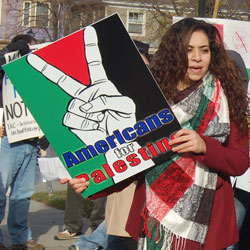 Whereas the American Studies Association is committed to the pursuit of social justice, to the struggle against all forms of racism, including anti-semitism, discrimination, and xenophobia, and to solidarity with aggrieved peoples in the United States and in the world;
Whereas the American Studies Association is committed to the pursuit of social justice, to the struggle against all forms of racism, including anti-semitism, discrimination, and xenophobia, and to solidarity with aggrieved peoples in the United States and in the world;
Whereas the United States plays a significant role in enabling the Israeli occupation of Palestine and the expansion of illegal settlements and the Wall in violation of international law, as well as in supporting the systematic discrimination against Palestinians, which has had documented devastating impact on the overall well-being, the exercise of political and human rights, the freedom of movement, and the educational opportunities of Palestinians;
Whereas there is no effective or substantive academic freedom for Palestinian students and scholars under conditions of Israeli occupation, and Israeli institutions of higher learning are a party to Israeli state policies that violate human rights and negatively impact the working conditions of Palestinian scholars and students;
Whereas the American Studies Association is cognizant of Israeli scholars and students who are critical of Israeli state policies and who support the international boycott, divestment, and sanctions (BDS) movement under conditions of isolation and threat of sanction;
Whereas the American Studies Association is dedicated to the right of students and scholars to pursue education and research without undue state interference, repression, and military violence, and in keeping with the spirit of its previous statements supports the right of students and scholars to intellectual freedom and to political dissent as citizens and scholars;
It is resolved that the American Studies Association (ASA) endorses and will honor the call of Palestinian civil society for a boycott of Israeli academic institutions. It is also resolved that the ASA supports the protected rights of students and scholars everywhere to engage in research and public speaking about Israel-Palestine and in support of the boycott, divestment, and sanctions (BDS) movement.
[TOP]
ASA Members Vote To Endorse Boycott of Israeli Academic Institutions
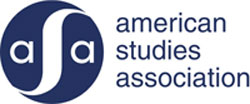 The members of the American Studies Association (ASA) have endorsed the Association’s participation in a boycott of Israeli academic institutions. In an election that attracted 1252 voters, the largest number of participants in the organization’s history, 66.05% of voters endorsed the resolution, while 30.5% of voters voted no and 3.43% abstained. The election was a response to the ASA National Council’s announcement on December 4 that it supported the academic boycott and, in an unprecedented action to ensure a democratic process, asked its membership for their approval. (Please see the ASA website, theasa.net, for a collection of supporting documents.)
The members of the American Studies Association (ASA) have endorsed the Association’s participation in a boycott of Israeli academic institutions. In an election that attracted 1252 voters, the largest number of participants in the organization’s history, 66.05% of voters endorsed the resolution, while 30.5% of voters voted no and 3.43% abstained. The election was a response to the ASA National Council’s announcement on December 4 that it supported the academic boycott and, in an unprecedented action to ensure a democratic process, asked its membership for their approval. (Please see the ASA website, theasa.net, for a collection of supporting documents.)
One year ago the ASA Executive Committee was asked to consider a resolution from the Academic and Community Activism Caucus of the Association. The EC then forwarded the resolution to the National Council and, following a lengthy period of careful deliberations, the Council unanimously voted to draft a revised resolution and to recommend members endorse it.
The resolution is in solidarity with scholars and students deprived of their academic freedom and it aspires to enlarge that freedom for all, including Palestinians. The ASA’s endorsement of the academic boycott emerges from the context of US military and other support for Israel; Israel’s violation of international law and UN resolutions; the documented impact of the Israeli occupation on Palestinian scholars and students; the extent to which Israeli institutions of higher education are a party to state policies that violate human rights; and finally, the support of such a resolution by a majority of ASA members.
The National Council engaged and addressed questions and concerns of the membership throughout the process. During the open discussion at the recent convention, members asked us to draft a resolution that was relevant to the ASA in particular and so the Council’s final resolution acknowledged that the US plays a significant role in enabling the Israeli occupation of Palestine. Members asked for clarification about how the resolution would affect the ability of ASA members to engage with colleagues in Israel, and the Council developed guidelines specifying that collaboration on research and publications between individual scholars does not fall under the ASA boycott. Members asked us to deliberate carefully and consider diverse opinions and the Council thus deliberated for 8 days. Members asked that we create spaces for discussion and the Council established a lively Facebook page. Finally, members asked the National Council to put the resolution to a vote and the Council listened.
The ASA National Council thanks all who took seriously the task of debating and discussing the resolution. As the nation’s oldest and largest association devoted to the interdisciplinary study of American culture and history, the Association’s mission includes the ongoing study and discussion of pressing issues faced by the US and the world. As part of that process and in keeping with the ASA’s commitment to academic freedom, we are thus pleased to announce plans to bring Israeli and Palestinian academics to the 2014 national convention in Los Angeles.
At the same time we look forward to continuing the Association’s other work such as further supporting graduate student travel to the conference. Most important, we are making plans to add a regular DuPont Circle-based staffer who will organize a joint task force with the members of the Departments, Programs and Centers Committee to provide support for programs under review or experiencing other challenges.
[TOP]
Action Needed to Stop Passage of Dangerous Bill in NY State Assembly Opposing Free Speech
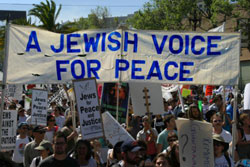 On January 28, the New York State Senate overwhelmingly passed a bill targeting the American Studies Association (ASA) because it recently passed a resolution supporting an academic boycott of Israel. If this becomes law it would prohibit public universities and colleges from using any taxpayer money on groups that support boycotts of Israel. For instance, such funds could not be used for travel or lodging for a faculty member attending a meeting of a group that supports a boycott of Israel. Just as dangerous, this law will lay the groundwork for other attempts to silence debate and opposition on other controversial issues. A similar bill is quickly moving through the process in the NY State Assembly…we must act now to stop it!
On January 28, the New York State Senate overwhelmingly passed a bill targeting the American Studies Association (ASA) because it recently passed a resolution supporting an academic boycott of Israel. If this becomes law it would prohibit public universities and colleges from using any taxpayer money on groups that support boycotts of Israel. For instance, such funds could not be used for travel or lodging for a faculty member attending a meeting of a group that supports a boycott of Israel. Just as dangerous, this law will lay the groundwork for other attempts to silence debate and opposition on other controversial issues. A similar bill is quickly moving through the process in the NY State Assembly…we must act now to stop it!
The Higher Education Committee of the NY State Assembly was scheduled to discuss their version of this legislation February 3. If they pass it out of committee it could go to the full Assembly for a vote 3 days from that. And since Assembly Speaker Sheldon Silver introduced the Assembly bill we can assume he will move to a vote immediately.
According to NY State Senator Klein, chief proponent of the legislation. “We need to marginalize the politics of intolerance whenever it rears its ugly head. I will not allow the enemies of Israel or the Jewish people to gain an in inch in New York. The First Amendment protects every organization’s right to speak, but it never requites taxpayers to foot the bill.”
The reality is that this legislation is a direct assault on our First Amendment right to freely and openly speak our minds in opposition to the policies of any government, including the Israeli government. Imagine if legislation like this was passed during the struggle to end apartheid in South Africa!
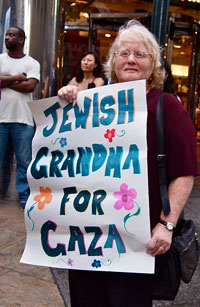 According to Dima Khalidi of Palestine Solidarity Legal Support and Cooperating Counsel with the Center for Constitutional Rights, the First Amendment “prohibits public officials from denying public benefits as a way of censoring speech activities. These bills clearly aim to discourage expressive activities such as boycotts based on the legislators’ personal disagreement with the content of the expression. Painting the ASA boycott resolution as discriminatory is not only inaccurate, but also distracts from the fact that its purpose is in fact to protest the human rights violations for which Israel is responsible, and the discriminatory policies and practices of the Israeli government. These bills would be both a violation of free speech and academic freedom, which the proposed legislation cynically purports to defend.”
According to Dima Khalidi of Palestine Solidarity Legal Support and Cooperating Counsel with the Center for Constitutional Rights, the First Amendment “prohibits public officials from denying public benefits as a way of censoring speech activities. These bills clearly aim to discourage expressive activities such as boycotts based on the legislators’ personal disagreement with the content of the expression. Painting the ASA boycott resolution as discriminatory is not only inaccurate, but also distracts from the fact that its purpose is in fact to protest the human rights violations for which Israel is responsible, and the discriminatory policies and practices of the Israeli government. These bills would be both a violation of free speech and academic freedom, which the proposed legislation cynically purports to defend.”
Now is the time for action! Now is the time for members of the Assembly to hear from us: this assault on free speech and academic freedom must be stopped today! [In part as a result of a flood of calls opposing the bill, it was amended on February 6 and re-submitted to the education committee, where it currently remains. It has not yet passed out of the committee, which is necessary before it comes to the full floor for a vote — VOR Ed.]
What you can do:
1) Contact key members of the NY State Assembly and call on them to vote No:
The chair of the Higher Education Committee, Deborah Glick, needs to hear from people: Albany Office phone 518-455-4841, District Office phone 212-674-5153.
Call, email fax or use any other method to contact Assembly Speaker Sheldon Silver: Albany Office phone 518-455-3791; District Office phone 212-312-1420.
2) Contact Your State Assembly Member.
3) Help spread the word. Share this message as widely and as quickly as you can. Try to get this information to people throughout NY State. It is important that this be a state-wide effort. Send a letter to the editor to express your opposition to this legislation.
What the Legislation Passed by the NY State Senate Says
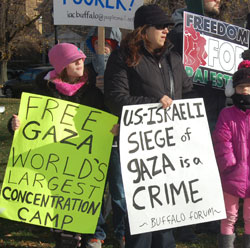 “No college in this state may use state aid provided directly to such college to: fund an academic entity, provide funds for membership in an academic entity or fund travel or lodging for any employee to attend any meeting of such academic entity if such entity has issued a public resolution or other official statement or undertaken an official action boycotting a host country or higher education institutions located in such country.”
“No college in this state may use state aid provided directly to such college to: fund an academic entity, provide funds for membership in an academic entity or fund travel or lodging for any employee to attend any meeting of such academic entity if such entity has issued a public resolution or other official statement or undertaken an official action boycotting a host country or higher education institutions located in such country.”
A “host country” is defined as a country in which there is a higher education institution chartered by the NYS Board of Regents. Thus, the prohibition applies only to boycotts against academic institutions in Israel, Hungary, Lebanon, and the Czech Republic.
If this legislation becomes law, no college may provide funds for any employee to pay for membership in, or for travel or lodging to attend a meeting of any organization of professors that has issued a resolution boycotting a higher education institution in Israel. In other words, the legislation would prohibit a faculty member from getting funds to travel to an American Studies Association (ASA) meeting, even if that meeting is unrelated to the boycott, or the professor herself is opposed to the boycott. If a college violates the prohibition it loses all public funds for that academic year. This applies to public and private universities that receive state funds.
Why We Are Calling on Members of the NY State Assembly to Vote NO on this Legislation
1. Advocacy in support of a boycott, like all advocacy, is a constitutionally protected form of expression. While such advocacy may be controversial, the First Amendment is a bulwark against government censorship of controversial speech.
2. It has been more than 60 years since this legislature sought to prohibit advocacy on any subject or for any point of view. To do so now will return us to the days of McCarthyism, when colleges and universities became places of fear and suspicion, and when vigorous and contentious debate was replaced by a demand for conformity.
3. Advocacy of boycotts — and the boycotts themselves — played a substantial role in changing discriminatory policies in the American south and in South Africa, to say nothing of strengthening labor struggles throughout our country. Advocacy of boycotts by activist students and faculty has a long and honorable place in U.S. history. The NY State legislature should not be on record as suggesting that advocacy of such an effective means for promoting peaceful change is somehow illegitimate.
4. Public universities are a critical resource for poor and working-class New Yorkers — and silencing speech in those institutions by using tax dollars as leverage is a particular assault on the speech and freedom of those who rely on public education.
[TOP]
Professional Staff Congress-CUNY
Opposes NY State Bills Punishing Those Advocating Boycott of Israel
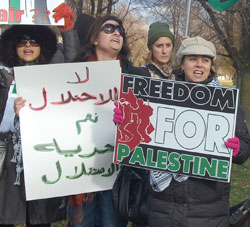 The Professional Staff Congress-City University of New York (PSC-CUNY) joins the American Association of University Professors (AAUP), New York State United Teachers (NYSUT), the City University Faculty Senate Executive Committee, the New York State AAUP Conference and the New York University AAUP chapter in opposing New York Assembly Bill A.8392. The PSC also opposes a nearly identical New York Senate Bill, S.6438, passed by the New York Senate on January 28, 2014.
The Professional Staff Congress-City University of New York (PSC-CUNY) joins the American Association of University Professors (AAUP), New York State United Teachers (NYSUT), the City University Faculty Senate Executive Committee, the New York State AAUP Conference and the New York University AAUP chapter in opposing New York Assembly Bill A.8392. The PSC also opposes a nearly identical New York Senate Bill, S.6438, passed by the New York Senate on January 28, 2014.
The two bills would prohibit colleges and universities in New York State from using State funding to support employees’ participation in academic groups or associations that have passed resolutions or taken official actions to promote boycotts against certain countries or their higher education institutions.
The proposed legislation would also prohibit colleges and universities in New York State from using State funding to pay membership dues to those associations or to reimburse travel or lodging for an employee attending any meeting of such association. Colleges or universities that act in violation of the prohibition would not be eligible for any State funding for that academic year.
In announcing the proposed Assembly legislation, Speaker Sheldon Silver cited the recent resolution passed by the American Studies Association (ASA) endorsing a boycott of Israeli academic institutions and supporting the protected rights of scholars and students everywhere to engage in research and public speaking about Israel - Palestine.
The proposed legislation, if enacted, would mean that if any CUNY college paid for travel for a faculty member to present an academic paper on, for instance, labor history at a regional meeting of the American Studies Association, CUNY would lose its entire New York State funding for that year. Had such legislation been in place in 1980, any New York college or university funding an employee to attend any academic entity sponsored by the United Nations would have lost its eligibility for State funding — because the UN had enacted a boycott of “ all cultural, academic, sports, and other exchanges ” with South Africa. PSC members hold a variety of positions on the Israel/Palestine conflict, and hold such positions deeply. PSC members also hold a range of positions on the efficacy and legitimacy of academic boycotts as a strategy. We stand together, however, in opposing legislation that would subject New York State funding for colleges and universities to this political litmus test. Such legislation is dangerous to all members of the academic community, whatever our political positions.
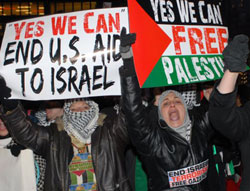 Academic freedom is meaningless if it does not protect those who hold unpopular positions, including those who advocate academic boycotts.
Academic freedom is meaningless if it does not protect those who hold unpopular positions, including those who advocate academic boycotts.
In its statement on the proposed New York State Assembly bill, the AAUP writes that such legislation, if enacted, “could impose greater restrictions on the academic freedom of faculty members in New York than are threatened by the ASA boycott resolution.”
The bills purport to oppose collective punishment of countries or their academic institutions, yet they would impose a collective punishment — denial of State funding for a college’s students, faculty and staff — when neither collective nor individual punishment is warranted.
Universities may limit funding for scholarly travel and participation in professional organizations, but such funding decisions should be made by representative faculty bodies based on professional standards, and not on political criteria dictated by elected officials.
The PSC will work with its membership and all of its affiliates to oppose S.6438 and A.8392. We call on all adherents of academic freedom to join us.
Passed unanimously by the PSC Delegate Assembly, January 30, 2014.
[TOP]
Palestinians Retake Village in Occupied West Bank

Hundreds of Palestinians assembled and erected a protest village in the occupied West Bank on Friday, January 31. By Monday morning, February 3, Israeli military forces had the area surrounded and had arrested several activists en route to the area.
Organizers announced a new campaign — Milh al-Ard (Arabic for “Salt of the Earth”) — in response to Israel’s ongoing efforts to colonize and annex the Jordan Valley. The protest village is situated among the ruins of Ein Hijleh, an historic Palestinian village forcibly depopulated by Israel’s army in the 1967 war.
Groups of Palestinians came from across present-day Israel, occupied East Jerusalem and the broader West Bank. As of Friday night, Diana Alzeer, spokesperson for the Popular Struggle Coordination Committee (PSCC), estimated that around 500 people were camped out in Ein Hijleh.
“We brought over 40 people in buses and cars,” Bassem Tamimi, a Palestinian activist from the village of Nabi Saleh, told The Electronic Intifada. Other large groups came from places like Bilin, Ramallah, Abu Dis and Dheisheh refugee camp. There was also a small presence of activists from the International Solidarity Movement. Tamimi added, “Our whole families came, including our wives and children because we cannot be truly liberated from the occupation without them struggling alongside us.”
On the side of an Israeli highway that dissects the West Bank, the land of Ein Hijleh belongs to the Orthodox Church and is surrounded from all sides by Israeli army bases, settlements and closed military zones. On Friday morning, one bus of activists with the PSCC was stopped by Israeli military forces at a “flying” (temporary) checkpoint between Ramallah and Jericho. After being told they were forbidden from passing, activists got off the bus and marched past the soldiers and began directing traffic themselves. With the soldiers confused and distracted, the passengers subsequently got back on the bus and continued to Ein Hijleh.
Army “could not stop us”
Over the weekend, Israeli soldiers began to limit access to the area, closing parts of Highway 90 and reportedly turning away journalists and activists. Though soldiers have tried to prevent activists from delivering food and supplies to the village, the campers were able to receive food from families from the surrounding communities.
Mustafa Barghouti, a Palestinian politician and activist told The Electronic Intifada that the event brought out a “fantastic level of participation,” particularly among Palestinian youth. The action is “also a great organizational success because the Israeli army could not stop us,” Barghouti added. “They spread a huge number of soldiers everywhere, but they didn’t know where we where going and how we where going to get there.”
Within hours of arriving, the Israeli military had the area surrounded on all sides. Though highways and dirt paths leading to the area were spotted with military jeeps and border police, people continued to pour into the area well into Friday evening. By Saturday morning, however, Israeli occupation forces had begun to prevent journalists and activists from reaching Ein Hijleh.
Campers reported that they had begun rebuilding old uninhabited homes in the village. Campers in Ein Hijleh are sleeping in the remains of homes and tents. They have brought with them supplies, such as electricity generators, gas, food and drink.
“Linking to our history”
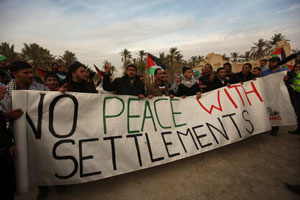 “We are building on several [previous] direct actions,” explained Alzeer. “But this is different because we are actually reclaiming a Canaanite village that used to exist, actually linking it to our Palestinian history on this land and our existence [here].” But the most important aspect of this latest direct action, Alzeer added, is “that it is taking place in the Jordan Valley.”
“We are building on several [previous] direct actions,” explained Alzeer. “But this is different because we are actually reclaiming a Canaanite village that used to exist, actually linking it to our Palestinian history on this land and our existence [here].” But the most important aspect of this latest direct action, Alzeer added, is “that it is taking place in the Jordan Valley.”
The vast majority of the Jordan Valley falls within Area C, the 60 percent of the West Bank designated to full Israeli military and civil control by the Oslo accords.
According to a report by the Israeli human rights group B’Tselem, more than 64,000 Palestinians lived in the Jordan Valley in 2009. They were vulnerable to Israeli military attacks and forced evictions, the report stated. Additionally, nearly 10,000 Israeli settlers lived in Jewish-only settlements across the Jordan Valley (“Dispossession and exploitation: Israel’s policy in the Jordan Valley and northern Dead Sea,” May 2011 [PDF]).
In recent months, several Palestinian communities across the Jordan Valley have been demolished. Last Thursday, homes and structures belonging to over a dozen families were razed by Israeli bulldozers in the Palestinian community of Khirbet Jamal (“Soldiers Invade Homes, Conduct Training, In West Bank Village,” IMEMC, 30 January 2014).
On January 8, Israeli forces attacked the shepherding community of Khirbet Ein Karzaliyah, leaving 25 people — 15 of them minors — without shelter in harsh winter conditions. Israeli authorities confiscated the tents given to the displaced families by the International Committee of the Red Cross (“Israeli authorities demolish Palestinian shepherding community in Jordan Valley,” B’Tselem, January 8 2014).
In 2013 alone, more than 1,000 persons were displaced in East Jerusalem and the rest of the West Bank by demolitions and evictions, James Rawley, the UN’s humanitarian coordinator, said recently (“UN slams Israel destruction of Jordan Valley homes,” Ma’an News Agency, February 1 2014).
On September 16 last year, more than 120 persons were displaced from Khirbet al-Makhul after Israeli military and police forces bulldozed the homes of 12 families.
Home to a vast array of natural resources, the area has been repeatedly plundered by Israel. B’Tselem stated that 77.5 percent of the Jordan Valley is off limits to the indigenous Palestinian population.
“Fertile”
 “The Jordan Valley is one of the most fertile areas in Palestine, in terms of agriculture, in terms of water resources [and] minerals,” said Alzeer.
“The Jordan Valley is one of the most fertile areas in Palestine, in terms of agriculture, in terms of water resources [and] minerals,” said Alzeer.
“Palestinians have been evacuated from the Jordan Valley. Their houses have been demolished constantly. Land is being confiscated and we have no access to use of water.”
Thousands of Palestinians in Bedouin communities across all of Area C are facing imminent eviction to make way for new Jewish-only areas and the expansion of existing ones (“Thousands of Palestinians in Area C face threat of expulsion from their homes,” B’Tselem, October 22, 2013).
In other areas of the Jordan Valley, communities have been uprooted so that Israel’s military can build training areas known as “firing zones.”
In the unlikely event of a US-brokered two-state solution between Israel and the Palestinian Authority, Israeli officials have repeatedly insisted that the Jordan Valley will remain under Israeli control.
In late December, an Israeli ministerial committee voted in favor of a bill to annex the Jordan Valley.
Speaking at the World Economic Forum in Davos, Switzerland, last month Israeli Prime Minister Benjamin Netanyahu stated that he did “not intend to remove a single settlement” (“Israeli official: Palestine should allow settlers,” Ynet, January 26, 2014).
Under U.S. Secretary of State John Kerry’s proposed plans for the future of the valley, the area would be gradually transferred from Israeli control to that of the Palestinian Authority over an unspecified period of time. The area would be patrolled by Israeli drones, according to right-wing Israeli media reports (“Netanyahu: I will not evict Israelis from the Jordan Valley,” Arutz Sheva, January 24, 2014).
The current negotiations between Israel and the Palestinian Authority, Diana Alzeer added, “are aiming to establish a Palestinian state that is completely disfigured and that will exclude the Jordan Valley … and this is something that we completely refuse.”
“We will never give up”
Mustafa Barghouti echoed these sentiments. Protesters, he said, had gathered to resurrect “this village to send a message to the Israelis and the world that we will never give up the Jordan Valley.”
Barghouti added that “change can happen only by changing the balance of power through popular resistance — acts like this one — and through boycott, divestment and sanctions campaigns worldwide,” referring to the growing international campaign that calls for an economic, cultural and academic boycott of Israel until it complies with international law. […]
[TOP]
